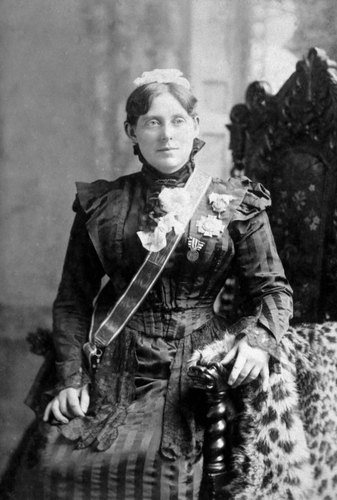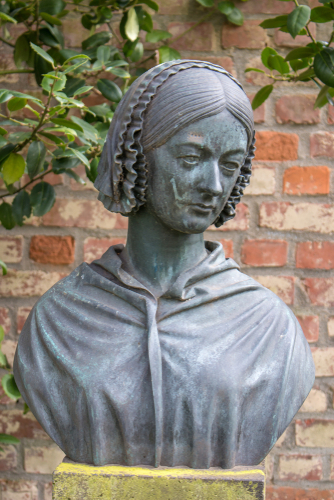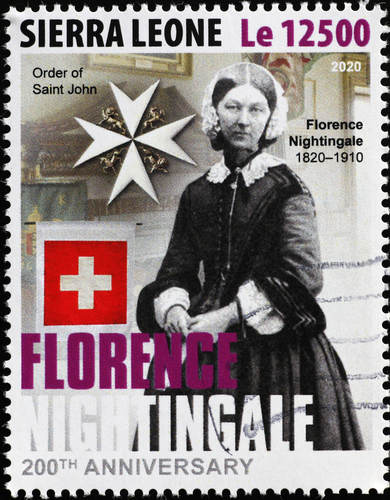Florence Nightingale, born on May 12, 1820, in Florence, Italy, is celebrated as the founder of modern nursing and a pioneering healthcare reformer.
Her legacy is marked by her tireless dedication to improving patient care, her innovative use of statistics in healthcare, and her advocacy for public health and sanitation.
Nightingale’s work during the Crimean War and the establishment of the Nightingale Training School for Nurses set new standards in nursing education and patient care. Her birthday is commemorated as International Nurses Day, and her influence continues to shape nursing and healthcare practices today.
Florence Nightingale Facts
1. Born on May 12, 1820, in Florence, Italy
Florence Nightingale was born in the city of Florence, Italy, to a wealthy and well-connected British family.
Also Read: Accomplishments of Florence Nightingale
Her full name, Florence Nightingale, was given to her because she was born in the city. She grew up in England but maintained a strong connection to her Italian heritage throughout her life.

2. Pioneered modern nursing
Florence Nightingale is renowned for her pioneering role in the development of modern nursing. At a time when nursing was often performed by untrained and unskilled individuals, she revolutionized the profession by introducing systematic training and principles.
Her experiences during the Crimean War exposed her to the deplorable conditions in military hospitals, and she made significant efforts to improve patient care by implementing strict hygiene practices and establishing protocols for nurses.
Nightingale’s emphasis on compassion, hygiene, and evidence-based care became the foundation for modern nursing practices.
3. Known as the “Lady with the Lamp” during the Crimean War
Florence Nightingale’s work during the Crimean War (1853-1856) earned her the nickname “The Lady with the Lamp.” She and her team of nurses tirelessly cared for wounded soldiers in the British Army hospitals in Crimea.
Also Read: Mother Teresa Timeline
Nightingale’s dedication and commitment to her patients were particularly evident during her nightly rounds. She would carry a lamp to illuminate her way as she checked on the injured and provided comfort and care.
Her presence and commitment became a symbol of hope and compassion for the soldiers she cared for, and she remains widely associated with this iconic image of the nurse with a lamp.
4. Established the Nightingale Training School for Nurses in 1860
Florence Nightingale’s commitment to improving nursing education and standards led her to establish the Nightingale Training School for Nurses at St. Thomas’ Hospital in London in 1860. This institution was one of the first formal nursing schools in the world.
Nightingale’s vision was to provide a structured and rigorous education for nurses, emphasizing both practical clinical skills and a strong foundation in science and ethics.
The Nightingale School set the precedent for modern nursing education, and it became a model for nursing schools worldwide.

5. Used statistics to improve hospital hygiene and reduce mortality rates
Florence Nightingale was not only a hands-on caregiver but also a pioneer in the use of statistics and data analysis in healthcare. During her time in the Crimea, she collected and analyzed data on patient outcomes, infection rates, and hospital conditions.
She used statistical methods to demonstrate the importance of cleanliness, proper sanitation, and improved hospital hygiene in reducing mortality rates.
Her data-driven approach played a significant role in influencing healthcare reforms and public health policies, emphasizing the critical role of hygiene in patient care.
6. Wrote influential books, including “Notes on Nursing”
Florence Nightingale authored several influential books that continue to shape nursing and healthcare today. One of her most well-known works is “Notes on Nursing: What It Is and What It Is Not,” published in 1859.
In this book, Nightingale outlined her nursing philosophy and provided practical guidance for nurses. She stressed the importance of cleanliness, fresh air, and proper nutrition in patient care. “Notes on Nursing” also addressed the psychological and emotional needs of patients, emphasizing the role of compassion and empathy in nursing practice.
This book became a foundational text in the field of nursing and contributed to the professionalization of nursing as a respected and skilled profession.
7. Advocated for public health and sanitation
Florence Nightingale was not only a pioneer in nursing but also a fervent advocate for public health and sanitation. She believed that preventing illness and promoting health were essential components of healthcare.
Nightingale recognized that clean water, proper sanitation, and healthy living conditions were critical to preventing the spread of diseases. Her advocacy extended beyond hospitals and into the broader community.
She worked tirelessly to improve sanitation standards in homes, public institutions, and urban environments. Her efforts helped raise awareness about the importance of public health measures, leading to significant improvements in sanitation practices.

8. Her birthday, May 12, is celebrated as International Nurses Day
Florence Nightingale’s contributions to nursing and healthcare are celebrated annually on her birthday, May 12th. This day is recognized worldwide as International Nurses Day, a day to honor and appreciate the dedication and hard work of nurses around the globe.
It is also a time to reflect on the influence of Nightingale’s work in shaping the nursing profession and the healthcare industry.
9. Came from a wealthy and privileged background
Florence Nightingale’s background was marked by privilege and wealth, which was unusual for a woman of her time. Born into an affluent British family, she received a comprehensive education, including subjects typically reserved for men.
While societal expectations for women of her class were often limited to marriage and homemaking, Nightingale defied conventions and chose a career in nursing, driven by her strong sense of purpose and compassion.
10. Her legacy continues to influence nursing and healthcare today
Florence Nightingale’s legacy endures in the form of modern nursing and healthcare practices. Her pioneering work in nursing education, emphasis on hygiene, and data-driven approach to healthcare have had a profound and lasting impact on the profession.
Today, nurses around the world draw inspiration from Nightingale’s commitment to patient care and her dedication to improving healthcare outcomes. Her principles of compassion, evidence-based practice, and patient advocacy continue to shape the values and standards of nursing, ensuring that her legacy remains a vital force in the field of healthcare.
